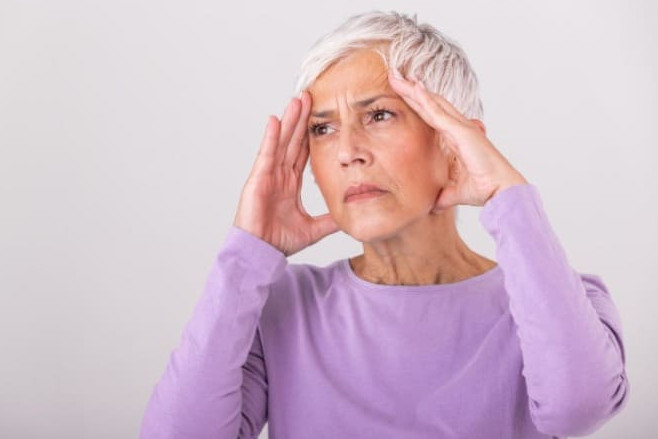During menopause, women experience physical and mental changes that they will not experience before they reach their 50s and 60s of age. Menopause can occur earlier for some women, and that is called early menopause.
Early menopause: what is it?
Medically, menopause is defined as the absence of a menstrual period for 12 consecutive months in the life of women. Usually, menopause occurs at the age of 51, but sometimes it occurs earlier due to illness, genetics, or surgery. There is also a wide variation in the timing of natural menopause among women.

The causes of premature menopause
The onset of menopause before the age of 40 is considered premature menopause. Premature ovarian failure is another medical cause of premature menopause. Premature ovarian failure is not the same as premature menopause, technically. The function of the ovaries naturally ceases before the age of 40 in premature ovarian failure. Premature ovarian failure often leads to infertility, primary ovarian failure is usually associated with premature ovarian failure, and early menopause symptoms are usually associated with premature ovarian failure.
Chemotherapy or radiation therapy to the pelvis can also cause premature menopause. As well as surgery to remove the ovaries in good condition, these treatments can damage the ovaries and lead to ovarian failure. A surgical removal of both ovaries, whether benign or malignant, will lead to premature failure; removing the uterus leads to menopause, which only means that menstrual bleeding does not occur, in which case the ovaries will continue to produce hormones. Medicines, chronic diseases, pituitary and hypothalamic tumors, psychiatric disorders, and other rare and unspecified conditions may also contribute to premature failure.
Genetics (hereditary) factors, diseases such as thyroid disease, viral infection, hormonal disorders, and eating disorders can cause early menopause. Those women who are being treated for cancer or other conditions that require surgery to remove female organs are at risk for surgery or treatment due to menopause.
Symptoms of early menopause are similar to those of normal menopause, including:
Swings in mood
Dryness of the vaginal canal
Memory and cognition changes
hot flashes
Decreased sexual desire
sleep disorders
Weight Gain
night sweat
Intercourse-related vaginal pain
Premenopause is usually accompanied by irregular periods, which can begin years before the menstrual cycle ends.
Menopause diagnosis:
Amenorrhea is not diagnosed by a specific test, but sometimes women start experiencing menopausal symptoms and irregular periods. During that time, they may undergo tests to determine the function of their ovaries, such as pregnancy tests.
Premature menopause treatment:
Premature menopause cannot be prevented by treatment
Early menopause symptoms can be relieved with hormone therapy and other treatments. Infertility and osteoporosis are complications of early menopause.
Elimination of symptoms and signs:
Early menopause cannot be prevented, but women who have reached menopause can manage the unpleasant symptoms with treatment options.

There are a variety of treatments available to relieve symptoms, including:
Contraceptive pills:
Menopausal symptoms can sometimes be relieved with this type of HT.
An antidepressant is:
In 60% of women, selective serotonin reuptake inhibitors (SSRIS) and related drugs control hot flashes.
It is possible to prevent severe dryness with non-hormonal gels, creams, and oils.
Women who have premature menopause may be able to conceive using donor eggs using assisted reproductive technologies.
Here are eight ways to prevent premature menopause:
Vitamin D and calcium:
A weakening of bones may be one of the first signs of menopause caused by hormonal changes during menopause. As a result, osteoporosis is more likely to develop. Calcium and vitamin D strengthen your bones. As a result, it is necessary to consume enough of these nutrients in your daily diet; Eat calcium-rich foods, such as yogurt, milk, and cheese.
The cheapest and most common way to get vitamin D is from sunlight. Sunlight produces vitamin D in your skin. Asian women may prefer to stay out of the sun and protect their skin. You can still get sufficient amounts of vitamin D from natural supplements if you want to avoid premature menopause.
Sport:
You exercise more than you eat, but your weight doesn’t change. It may be a sign of early menopause. Hormones, aging, lifestyle, and other factors can contribute to weight gain. Having too much body fat, however, can increase the risk of heart disease and diabetes. Maintaining a healthy and balanced diet becomes increasingly important as you age. Exercise is also recommended on a regular basis. It doesn’t have to be intense exercise, it could be a 15-minute yoga session or a daily walk.
Consume vegetables:
You have probably been told by your doctor that a diet rich in vegetables can naturally prevent symptoms of menopause. Eating more fruits and vegetables is great for your metabolism and body function since they are low in calories. Furthermore, eating vegetables can prevent several diseases as well.
Stay hydrated:
During menopause and before menopause, women often experience dryness due to a decrease in estrogen levels. Drinking 8 to 12 glasses of water a day can help prevent early menopause. Additionally, drinking water can reduce bloating caused by hormonal changes. Additionally, drinking enough water can help prevent weight gain and loss. Research has shown that drinking 500 ml of water 30 minutes before a meal can reduce your calorie intake by 13%.
Make sure you don’t skip meals:
A healthy diet is important, but it’s more important not to skip meals; When women want to lose weight, they skip meals and don’t eat at all. Women of all ages experience this. Skipping meals will only increase your appetite if you follow your health professional’s weight loss advice. Irregular meals can worsen menopause symptoms and make you more susceptible to illness. Regular meals do not provide your body with enough energy to produce enough antibodies to fight viruses.
Protein-rich foods include:
When you reach menopause, your muscles slowly begin to disappear, so eating high protein foods can help prevent this. It is possible to prevent muscle loss by eating high protein foods. Consuming high-protein foods decreases muscle velocity according to a study. As well as preventing muscle loss, high protein foods can also help you lose weight. Meat, eggs, nuts, and dairy products are all high in protein.
The phytoestrogens are:
In the body, phytoestrogens neutralize the effects of estrogen. Estrogen is responsible for the development and regulation of the reproductive system. Hormones can be balanced without a doubt with phytoestrogens, which are similar to estrogens.
Phytoestrogen-rich foods include:
Soy products
tofu
Flax seeds
Sesame Seed
Beans
The amount of estrogen in these foods, however, can vary depending on how they are processed. Some side effects can be caused by eating too much of these foods. Balance helps a lot when it comes to your diet, as you may not want to experience certain things.
Foods that cause allergies should be avoided:
Hot flashes, night sweats, and mood swings may be caused by certain foods. Premenopausal symptoms may worsen when you eat these allergic foods at night. Caffeine, alcohol, and spicy foods are common allergens. To prevent menopause naturally, it is recommended that you pay attention to the foods that cause your allergies and reduce your intake of these foods. Menopause is inevitable because it is part of the human phase; Menopause is not a disease, rather it is a natural process.


